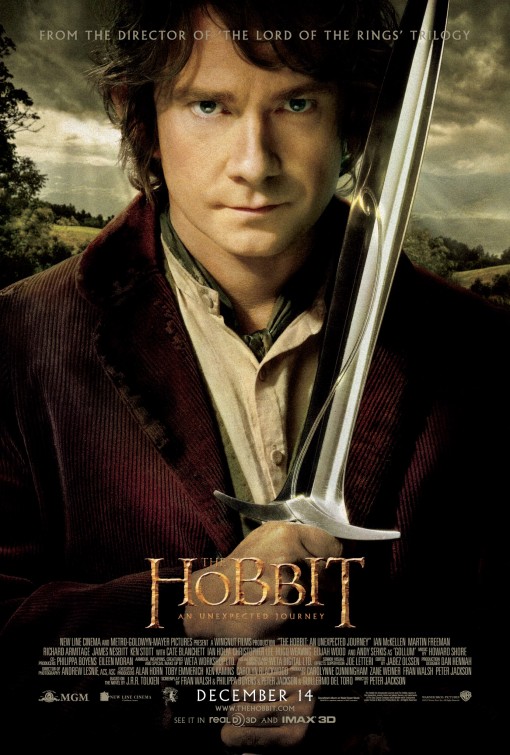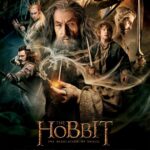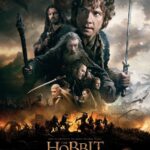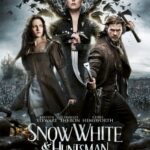From The Smallest Beginnings Come The Greatest Legends
Director
Peter Jackson
Starring
Ian McKellen
Martin Freeman
Richard Armitage
Before proceeding with this review, a few items need to be highlighted. First of all, I had low to no expectations for this film. I was never a fan of the book and thought the idea of spreading a simple 300 page story out over three instalments was horribly indulgent, gratuitous and unnecessary. Furthermore, I’m not a fan of 3D (as regular readers will know) but always welcome new industry changes, so was curious to see what the 48 frames per second would produce.
The film opens with Bilbo Baggins [Ian Holm] reflecting on his adventures on his 111th birthday. The first thing he establishes is a brief history of the dwarf king, Thror and his kingdom in the mountain, Erebor. The mountain metropolis is extremely prosperous until the dragon Smaug appears, desolates the neighbouring town of men and sacks the mountain keep. Thror’s grandson, Thorin [Armitage] leads his people to safety but after men and elves refuse to risk their lives in assistance, he grows bitter and his people become nomadic. As he begins to pen his thoughts, we witness Bilbo’s [Freeman] first encounter (since childhood) with the wandering wizard, Gandalf the Grey [McKellen]. The back-and-forth sets up the wily nature of the wizard and the bumpkin life of a hobbit quite nicely before Bilbo retreats into his house and Gandalf makes an unseen mark in dwarfish on his front door. That evening, Bilbo is visited by twelve loud and rambunctious dwarves, led by Thorin Oakenshield. Gandalf has in his possession an indecipherable map and a key to a side-entrance into Erebor. As he has been charged to find a fourteenth member of the company of dwarves, he has selected Bilbo. After a great deal of deliberation, feasting and singing, Bilbo eventually agrees to join the quest. On their way to the Lonely Mountain, the group are set upon by orcs, speak with wizards, witness giants fight one another, outwit trolls, take council with elves and enter a goblin city in the mountains. On top of all that, Bilbo gets briefly separated from the company and comes across a ghoulish creature and a small golden ring in his possession.
This really is a character driven film and the screen is constantly brimming with new monsters and creatures demanding your attention from start to finish. Having said that, they seem to fall into two distinct categories: completely forgettable and timelessly spectacular. Other than the various Lord Of The Rings cameos, Bilbo, Thorin, Gandalf, Dwalin [Graham McTavish], Bailn [Ken Stott] and Bofur [James Nesbitt] come to mind. Fans of the book may be surprised, not only by the additional characters but the additional developments, such as the whole Azog the Defiler [Manu Bennett] storyline and the inclusion of Radagast the Brown [Sylvester McCoy] both of which can be found littered in Tolkien’s work. Their inclusion is highly gratuitous, as mentioned earlier, but add to the story as a whole and flesh out what is at best a very simplistic tale. Was this necessary? Of course not, The Hobbit could be presented in one film, two if you really want to include absolutely everything but three seems extremely uncalled for. Having said that, I’m looking forward to each instalment, so maybe more is better. Who knows?
With the cameos, familiar settings, returning production crew and notable directorial traits, Middle Earth nostalgia really grabs you from the get-go. The Hobbit is certainly much lighter affair than Lord Of The Rings but still imbued with fantastical elements and that adventurous spirit that really immerses you in a mystical world. This is of course cemented by the return of Howard Shore and his instantly transportive score. The returning elements are a welcome nod but the new themes of the dwarves and goblins are thundering, powerful and most importantly, memorable. The two books differ dramatically in content and tone, so I don’t see why audiences would be surprised that the films follow the same pattern? Personally, I think the two trilogies will go hand-in-hand, scorned by purists, held in high regard by fans, heralded by the public and secured as the only follow-up trilogy to experience any success whatsoever.
An Unexpected Journey is, naturally, far from perfect. First things first, one should not complain about the length of a Peter Jackson film any more than one should criticise Stanley Kubrick for using classical music rather than a bespoke score. These are merely directorial traits and if you’re going to watch a Tolkien adaptation, you should train your arse and bladder to handle the extended running times and drawn out pacing. Something you can moan about is Jackson’s understanding of physics. His most notable faux pas was throughout the entirety of King Kong (which I still love), wherein Ann Darrow would have been mangled to pieces had she been hurled about so thoroughly. There’s no difference here, fights trundle on well but every now-and-then you have to stop and ponder what you’re looking at exactly.. and who (all the dwarves look alike). Then some epically cinematic moment occurs whereby the company plummet down a gulley only to conveniently bounce off rock and stone on their wooden bridge-cum-surfboard to land with relative ease. Either that or the giant’s legs business.. bloody hell, talk about truly perilous ‘there’s no way we can survive this’ situations. Yes, I realise I’m berating the implausible physics in a world populated by dwarves, elves and dragons. No, I don’t care about the hypocrisy in that.
Then there are the technical aspects of the film. The most controversial decision above casting, running time and even the number of instalments is Peter Jackson’s opting to film in 3D at 48fps. For those who are not familiar with the terminology, the majority of films since 1927 have been shot at 24 frames per second; this essentially means the camera is taking twenty four pictures every second. Things like the news, documentaries and sporting events are shot at a higher frame rate, to capture all the fast-moving details and allow the editor to slow down certain shots. This has long been considered unsuitable for film as it makes everything look hyper-realistic and fake, as if the cast are merely walking about on a set, rather than through an enchanted forest or whatever. When shooting in 3D, however, a lot of this detail, brightness and sharpness is lost in the process and the human eye needs a good second or two to adjust to the image in order to process it, which means fast-paced editing is out of the question – a few reasons why 3D can fuck right off. So, in a way, 48 frames per second actually manages to compensate for this defect. Unfortunately, all the visual effects (namely the rabbit sled and the wargs) are unable to compete with the higher frame rate so what we end up with are reasonable effects that are on par with those seen in The Lord Of The Rings but as that was released a decade ago, we really expect much more. Do I think 48fps will become the industry standard? Possibly but I doubt it. Does it deserve to be? No. But, like all different technological cinematic undertakings, in the right hands they produce interesting effects.
All in all, An Unexpected Journey is a wondrous opening for this trilogy and a real return to form for Jackson. Everything felt nostalgic and reminiscent of one of the biggest cinematic trilogies ever released, while still bringing something fresh and new. Essentially, this is everything I imagine a Lord Of The Rings fan would want and something George Lucas has been trying to capture for decades.
Release Date:
14th December 2012
The Scene To Look Out For:
As I’ve stated above, the dwarf’s musical theme is fittingly stoic and resonant of mines, caves, darkness and pride. So, hearing Armitage and the cast singing the Misty Mountains piece was simply delightful. Short, I know but every time the theme returned I couldn’t help but sing the words in my mind. The only comparison I can give is that of the Skyrim theme, which instantly brings me back to that fictional realm, just as Jackson’s work has guaranteed its place in the hearts and minds of millions of cinemagoers worldwide.
Notable Characters:
Much like The Lord Of The Rings, this is very much an ensemble undertaking and highlighting a specific individual Is often tricky (I’ve been saying that a lot lately). However, whether due to the script or the performances, both Richard Armitage and Martin Freeman conjure fantastic performances that, to my mind, rival any presence in the preceding trilogy.
Highlighted Quote:
“I know you doubt me. I know you always have. And I do think of Bag End, that’s where I belong, that’s home. And you don’t have a home, it was taken from you. But I will help you get it back.. if I can”
In A Few Words:
“A glorious opening to a potentially marvellous trilogy, let down only by mediocre visual effects and a questionable technological undertaking”
Total Score: 3/5

![The Red Right Hand Movie Reviews [Matthew Stogdon]](https://reviews.theredrighthand.co.uk/wp-content/uploads/2021/12/cropped-header1.png)



